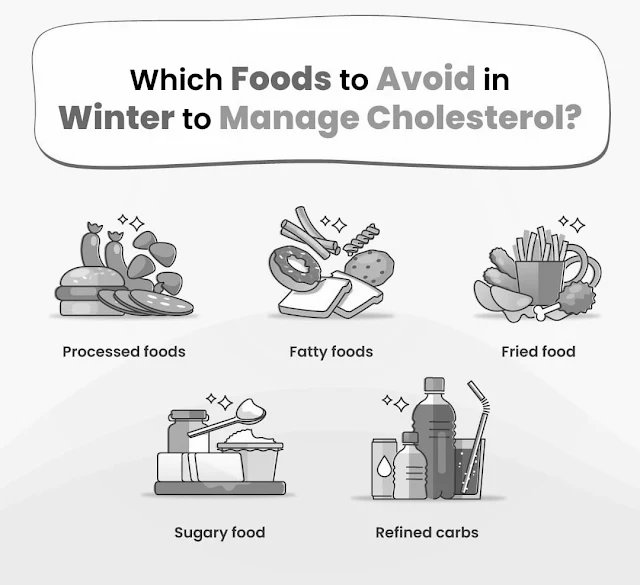Foods to Avoid in Winter to Manage Cholesterol
Managing cholesterol levels is crucial for maintaining overall heart health, especially during winter when dietary habits often shift toward rich, comforting foods. The colder months can lead to reduced physical activity and an increased reliance on high-calorie meals, which may adversely affect cholesterol levels. Here is a guide to foods you should avoid to keep your cholesterol under control this winter:
1. Fried and Deep-Fried Foods
Winter menus often feature fried snacks like samosas, fritters, and chips. These foods are typically cooked in oils rich in trans fats, which are known to raise LDL (bad cholesterol) levels and lower HDL (good cholesterol) levels. Opt for baked or air-fried alternatives to satisfy your cravings.
2. Processed and Red Meats
Processed meats such as sausages, bacon, and salami are high in saturated fats and cholesterol. Consuming these can lead to an increase in LDL cholesterol. Similarly, red meats like beef and lamb are also high in saturated fat. Consider leaner protein sources like chicken, turkey, or plant-based proteins.
3. Full-Fat Dairy Products
Cream, butter, full-fat cheese, and whole milk contain significant amounts of saturated fat. While these can be tempting in winter recipes like creamy soups and casseroles, substituting them with low-fat or plant-based options can make a big difference in managing cholesterol levels.
4. Sugary and Baked Goods
Winter festivities often bring an abundance of sweets, cakes, cookies, and pastries. These treats not only contain sugar but also often include hydrogenated oils and butter, which are high in trans and saturated fats. Limit your intake of these items and explore healthier dessert recipes.
5. Coconut and Palm Oil
While coconut oil and palm oil are popular in many cuisines, they are high in saturated fats that can elevate cholesterol levels. Choose heart-healthy oils like olive oil, avocado oil, or canola oil instead.
6. Heavy Cream-Based Soups and Sauces
Cream-based soups and sauces, a winter favorite, are often loaded with butter and heavy cream. These ingredients contribute to saturated fat intake, which can negatively impact your cholesterol. Opt for broth-based soups and use yogurt or plant-based milk for creaminess.
7. Alcoholic Beverages
Winter holidays are often accompanied by increased alcohol consumption, which can lead to weight gain and impact cholesterol levels negatively. Alcohol also disrupts liver function, which is crucial for cholesterol regulation. Moderation is key.
Tips for Heart-Healthy Winter Eating
*Incorporate Soluble Fiber: Foods rich in soluble fiber, such as oats, barley, beans, lentils, apples, and citrus fruits, can help lower LDL cholesterol.
*Increase Omega-3 Fatty Acids: Include fatty fish like salmon, mackerel, and trout in your diet, as they can help raise HDL cholesterol.
*Stay Active Indoors: Regular physical activity is vital for maintaining healthy cholesterol levels. Explore indoor exercises or winter sports.
*Hydrate Well: Drink plenty of water to maintain proper metabolism, even during cold weather when thirst is less noticeable.
By avoiding these cholesterol-raising foods and making mindful dietary choices, you can enjoy a healthy and heart-friendly winter season.
.png)


.png)











0 Comments